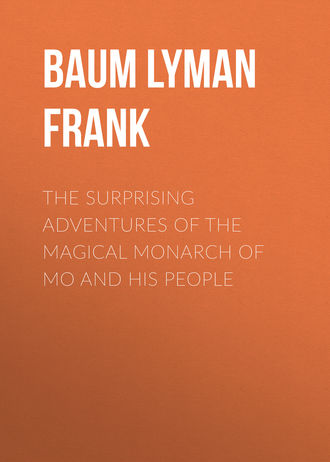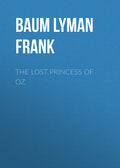
Лаймен Фрэнк Баум
The Surprising Adventures of the Magical Monarch of Mo and His People
The Sixth Surprise
KING SCOWLEYOW AND HIS
CAST-IRON MAN
ACROSS the mountains at the north of the Valley of Mo there reigned a wicked King named Scowleyow, whose people lived in caves and mines and dug iron and tin out of the rocks and melted them into bars. These bars they then carried away and sold for money.
King Scowleyow hated the Monarch of Mo and all his people, because they lived so happily and cared nothing for money; and he would have sent his army into the Valley to destroy the merry people who dwelt there had he not been afraid of the sharp swords that grew on their trees, which they knew so well how to use against their foes.
So King Scowleyow pondered for a long time how to destroy the Valley of Mo without getting hurt himself; and at last he hit on a plan he believed would succeed.
He put all his mechanics to work and built a great man out of cast-iron, with machinery inside of him. When he was wound up the Cast-iron Man could roar, and roll his eyes, and gnash his teeth and march across the Valley, crushing trees and houses to the earth as he went. For the Cast-iron Man was as tall as a church and as heavy as iron could make him, and each of his feet was as big as a barn.
It took a long time to build this man, as you may suppose; but King Scowleyow was so determined to ruin the pretty Valley of Mo that he made his men work night and day, and at last the Cast-iron Man was ready to be wound up and sent on his journey of destruction.
They stood him on the top of the mountain, with his face toward the Beautiful Valley, and began to wind him up. It took a hundred men a whole week to do this; but at last he was tightly wound, and the wicked King Scowleyow stood ready to touch the spring that made him go.
"One – two – three!" said the King, and touched the spring with his ringer.
The Cast-iron Man gave so terrible a roar that he even frightened the men who had made him; and then he rolled his eyes till they flashed fire, and gnashed his teeth till the noise sounded like thunder.
The next minute he raised one great foot and stepped forward, crushing fifty trees that stood in his path, and then away he went, striding down the mountain, destroying everything that stood in his way, and nearing with every step the Beautiful Valley of Mo.
The King and his people were having a game of ball that day, and the dog was acting as umpire. Suddenly, just as Prince Jollikin had made a home run and everybody was applauding him, a terrible roaring noise sounded in their ears, and they heard a great crashing of trees on the mountain side and saw a monstrous man approaching the Valley.
The people were so frightened they stood perfectly still, being unable to move through surprise and terror; but the dog ran with all his might toward the mountain to see what was the matter. Just as the dog reached the foot of the mountain the Cast-iron Man came tramping along and stepped into the Valley, where he ruined in one instant a large bed of lady-fingers and a whole patch of ripe pumpkin pies. Indeed, the entire Valley would soon have been destroyed had not the Cast-iron Man stubbed his toe against the dog and fallen flat on his face, where he lay roaring and gnashing his teeth, but unable to do any further harm.
Presently the King and his people recovered from their fright and gathered around their prostrate foe, marveling at his great size and strength.
"Had you not tripped him up," said the King to the dog, "this giant would certainly have destroyed my kingdom. Who do you suppose was so wicked as to send this monster to crush us?"
"It must have been King Scowleyow," declared the dog, "for no one else would care to harm you, and the giant came from the direction of the wicked King's country."
"Yes," replied the monarch, thoughtfully, "it must indeed have been Scowleyow; and it was a very unkind act, for we never harmed him in any way. But what shall we do with this great man? If he is left here he will scare all the children with his roarings, and none of the ladies will care to walk near this end of the Valley. He is so heavy that not all of us together could lift him, and even if we succeeded we have no place to put him where he would be out of the way."
This was indeed true; so all the people sat down in a circle around the Cast-iron Man and thought upon the matter intently for the space of an hour.
Then the monarch asked, solemnly, as became the importance of the occasion:
"Has any one thought of a way to get rid of him?"
The people shook their heads gravely and thought deeply for another hour. At the end of that time the dog suddenly laughed, and called out in a voice so loud that it startled them:
"I have thought of a way!"
"Good!" exclaimed the King. "Let us hear your plan."
"You see," explained the dog, "the Cast-iron Man is now lying on his face. If we could only roll him over on to his back, and then raise him to his feet again, he would be turned around, and would march straight back to where he came from, and do us no further harm."
"That is a capital idea," replied the King. "But how can we roll him over, or make him stand up?"
That puzzled them all for a while, but by and by Prince Thinkabit, who was a very clever young man, announced his readiness to undertake the job.
"First, bring me a feather," commanded the Prince.
The royal chamberlain hunted around and soon found for him a long, fluffy feather. Taking this in his hand the Prince approached the Cast-iron Man and tickled him under the left arm with the end of the feather.
"Ouch!" said the Cast-iron Man, giving a jump and rolling completely over, so that he lay on his back.
"Hurrah!" cried the people, clapping their hands with joy at this successful stratagem; "the Prince is a very wise Prince, indeed!"
Prince Thinkabit took off his hat and bowed politely to them in return for the compliment. Then he said:
"Bring me a pin."
So Nuphsed brought him a pin with a very sharp point, and the Prince took it and walked up to the Cast-iron Man, and gave him a sharp prod in the back with the point of the pin.
"Ouch!" again yelled the Cast-iron Man, giving at the same time such a great jump that he leaped square on his feet. But now, to their joy, they saw he was facing the mountains instead of the Valley.
As soon as the Cast-iron Man stood up the machinery began to work again, and he marched with great steps up the mountain side and over into the kingdom of the wicked Scowleyow, where he crushed the King and all his people, and laid waste the land wherever he went.
And that was their punishment for being envious of the good people of Mo.
As to the fate of the Cast-iron Man, he was wound up so tightly that he kept walking straight on until he reached the sea, where he stepped into the water, went down to the bottom, and stuck fast in the mud.
And I have no doubt he is there to this day.
The Seventh Surprise
TIMTOM AND THE PRINCESS
PATTYCAKE
NOW of all the monarch's daughters the most beautiful by far was the Princess Pattycake. The deep blue of her eyes made even the sky envious, and the moss roses blushed when they saw the delicate bloom on her cheeks. The long strands of her silken hair were brighter than sunbeams, while her ears were like two tiny pink shells from the seashore. Indeed, there was nothing in all the Valley so dainty and pretty as Princess Pattycake, and many young men would have loved her had they dared. But, alas! the Princess had a most terrible temper, and never was pleased with anything; so the young men, and even the old ones, were afraid to come near her.
She scolded from morning till night; she stamped her pretty foot with rage when any one spoke to her; and if ever her brothers tried to reason with her she boxed their ears so soundly that they were glad to let her alone. Even the good Queen could not love Pattycake as she did her other children, and the King often sighed when he thought of the ugly disposition of his beautiful daughter. Of course no one cared very much for her society, and she sat in her room all day long, refusing to join the others in their sports and games, and becoming more moody and bad-tempered the older she grew.
One day a young man came to the court to bring pickled peaches to his Majesty, the King. The youth's name was Timtom, and he lived so far away and came so seldom to court that never before had he seen the Princess Pattycake.
When he looked into her sweet, blue eyes he loved her at once for her beauty, and being both brave and bold he went directly to the King and asked for Pattycake's hand in marriage.
His Majesty was naturally surprised at so strange a request; so he said to the young man:
"What does the Princess say? Does she love you?"
"I do not know," replied Timtom, "for I have never spoken with her."
"Well," said the King, much amazed at the ignorance and temerity of the youth, "go and speak to my daughter about the matter, and then come and tell me what she replies."
Timtom went at once to the room where Princess Pattycake was moodily sitting, and said, boldly:
"I should like to marry you."
"What!" screamed the Princess, in a great rage; "marry me! Go away this instant, you impudent boy, or I shall throw my shoe at your head!"
Timtom was both surprised and shocked at this outburst, but he realized that the Princess had a remarkably bad temper. Still he was not moved from his purpose, for she was so pretty he decided not to abandon the attempt to win her.
"Do not be angry, for I love you," he pleaded, looking bravely into Pattycake's blue eyes.
"Love me?" echoed the surprised Princess; "that is not possible! Every one else hates me."
"They do not hate you," ventured Timtom; "it is your temper they hate."
"But my temper and I are one," answered the Princess, harshly, as she stamped her foot.
"Surely that is not so," returned the young man, "for certainly I love you, while your temper I do not like a bit. Don't you think you could love me?"
"Perhaps I might, if you could cure my bad temper; but my temper will not allow me to love any one. In fact, I believe that unless you go away at once I shall be obliged to box your ears!"
There seemed to be no help for her, so Timtom left the room sadly, and going to the King, told him what she had said.
"Then that is the end of the matter," declared the King, "for no one can cure Pattycake of her bad temper."
"I am resolved to try, nevertheless," replied Timtom, "and, if I succeed, you must give me the Princess in marriage."
"I will, and my blessing into the bargain," answered the King, heartily.
Then Timtom left the court, and went back to his father's house, where he thought on the problem for a week and a day. At the end of that time he was no nearer solving it than he was before; but his mother, who had noticed that her boy was in trouble, now came to him to ask the cause of his sad looks. Timtom told her all about the Princess Pattycake, and of his love for her, and the evil temper that would not be cured.
His mother gave him her sympathy, and after some thought, said to him: "You must go to the sorceress Maëtta and ask her assistance. She is a good lady, and a friend to all the King's family. I am quite sure she will aid you, if only you can find your way to the castle in which she lives."
"Where is this castle?" asked Timtom, brightening up.
"Away to the south, in the midst of a thick wood," answered his mother.
"Then," said he, sturdily, "if this castle exists, I will surely find it, for to win Pattycake is my only hope of happiness."
The next day he set out on his journey, filled with the hope of finding Maëtta's castle and securing her assistance.
Before he had gone very far a snow-storm began to rage. Now, the snow-storms in Mo are different from ours, for the snow is popcorn, and on this day it fell so thick and fast that poor Timtom had much difficulty in wading through it. He was obliged to stop frequently to rest, and ate a great deal of the popcorn that cumbered his path, for it was nicely buttered and salted.
Finally, to his joy, it stopped snowing, and then he was able to walk along easily until he came to the River of Needles.
When he looked on this river he was nearly discouraged, and could not think of a way to get across; for instead of water the river flowed a perfect stream of sharp, glittering needles.
Sitting down on the bank, he was wondering what he should do when to his astonishment a small but sharp and disagreeable voice said to him:
"Where are you going, stranger?"
Timtom looked down between his feet and saw a black spider, which sat on a blade of grass and watched him curiously.
"I am on my way to visit the sorceress Maëtta," replied Timtom; "But I can not get across the River of Needles."
"They are very sharp, and would make a thousand holes through you in an instant," remarked the spider, thoughtfully. "But perhaps I can help you. If you are willing to grant me a favor in return, I will gladly build a bridge, so you may cross the river in safety."
"What is the favor?" he asked.
"I have lost an eye, and you must ask the sorceress to give me a new one, for I can see but half as well as I could before."
"I will gladly do this for you," said Timtom.
"Very well; then I will build you a bridge," promised the spider; "but if you have not the eye with you when you return I shall destroy the bridge, and you will never be able to get home again."
The young man agreed to this, for he was anxious to proceed. So the spider threw a web across the river, and then another, and another, until it had made a bridge of spider-web strong enough for Timtom to cross over.
It bent and swayed when his weight was on the slender bridge, but it did not break, and after he was safe across he thanked the spider and renewed his promise to bring back the eye. Then he hurried away on his journey, for he had lost much time at the river.
But, to his dismay, the young man shortly came to a deep gulf, that barred his way as completely as had the River of Needles. He peered down into it and saw it had no bottom, but opened away off at the other side of the world. Here was an obstacle which might well dishearten the boldest traveler, and Timtom was so grieved that he sat down on the brink and wept tears of disappointment.
"What is troubling you?" asked a soft voice in his ear.
Turning his head the youth saw a beautiful white bird sitting beside him.
"I wish to visit the castle of the sorceress Maëtta on very important business," he replied, "but I can not get over the gulf."
"I could carry you over with ease," said the bird, "and shall gladly do so if, in return, you promise to grant me one favor."
"What is the favor?" inquired Timtom.
"I have forgotten my song, through having a sore throat for a long time," replied the bird. "So, try as I may, I can not sing a single note. If you will agree to bring me a new song from the sorceress I will take you over the gulf, and bring you back when you return. But unless you bring the song I shall not carry you over again."
Timtom joyfully agreed to this bargain, and then, sitting on the bird's neck, he was borne safely across the deep gulf.
After continuing his journey for an hour without further interruption he saw before him the edge of a great wood, and knew that in the midst of this forest of trees was the castle of Maëtta.
He thought then that his difficulties were all over, and tramped bravely on until he reached the wood. What, now, was the youth's horror on discovering on one side of his path a great lion, crouched ready to spring on any one who ventured to enter the wood, while on the other side was a monstrous tiger, likewise prepared to attack any intruder. The fierce beasts were growling terribly, and their eyes glowed like balls of fire.
Timtom gladly would have turned back had such a thing been possible, for his heart was full of fear. But he remembered that without the bird's song and the spider's eye he could never reach home again. He also thought of the pretty face of Princess Pattycake, and this gave him courage. Resolving to perish, if need be, rather than fail in his adventure, the youth stepped boldly forward, and when he approached the snarling guardians of the forest he gave one bound and dashed into the wood.
At the same moment the lion leaped at him from one side and the tiger from the other, and no doubt they would have devoured him had not Timtom's foot slipped just then and thrown him flat on the ground. The lion and the tiger therefore met in mid air, and each one thinking it had hold of Timtom, tried to tear him to pieces, with the result that in a few moments they had devoured each other instead of him.
The youth now strode rapidly through the wood, and was getting along famously when he came to a high wall of jasper that completely blocked his way. It was smooth as glass, and Timtom saw no way of climbing over it.
While he stood wondering how he might overcome this new obstacle a gray rabbit hopped out from the bushes and asked:
"Where do you wish to go, stranger?"
"To the castle of the sorceress Maëtta," answered Timtom.
"Well, perhaps I can assist you," said the rabbit. "I need a new tail badly, for my old one is merely a stump, and no use at all in fly-time. If you will be kind enough to get me a new tail from the sorceress Maëtta – a long, nice, bushy tail – I will dig under the wall, and so make a passage for you to the other side."
"I shall be pleased to return the favor by bringing you the tail," declared Timtom, eagerly.
"Very well; then you shall see how fast I can work," returned the rabbit. Immediately it began digging away with its little paws, and in a very short time had made a hole large enough for Timtom to crawl under the wall.
"If you do not bring the tail," said the rabbit, in a warning voice, "I shall fill up the hole again, so that you will be unable to get back."
"Oh, I shall bring the tail, never fear," answered the youth, and hurried away toward the castle of Maëtta, which was now visible through the trees.
The castle was built of pure, white marble, and was very big and beautiful. It stood in a lovely garden filled with blue roses and pink buttercups, where fountains of gold spouted showers of diamonds, and rubies, and emeralds, and amethysts, all of which sparkled in the sun so gorgeously that it made Timtom's eyes ache just to look at them.
However, he had not come to admire these things, gorgeous and beautiful though they were, but to win the Princess Pattycake; so he walked to the entrance of the castle, and seeing no one about, entered the great door-way and passed through.
He found himself in a passage-way covered with mother-of-pearl, where many electric lights were hidden in shells of most exquisite tintings. At the other end of the passage was a door studded with costly gems.
Timtom walked up to this door and knocked on it. Immediately it swung open, and the youth found himself in a chamber entirely covered with diamonds. In the center was a large diamond throne, and on this sat Maëtta, clothed in a pure white gown, with a crown of diamonds on her brow and in her hand a golden scepter tipped with one enormous diamond that glowed like a ball of fire. Above the throne was a diamond-covered chandelier, with hundreds of electric lights, and these made the Grand Chamber of Diamonds glitter so brightly that Timtom was nearly blinded, and had to shade his eyes with his hand.
But after a few moments he grew accustomed to the brightness and advancing to the throne fell on his knees before the sorceress and begged her earnestly to grant him her assistance.
Maëtta was the most beautiful woman in all the world, but she was likewise gracious and kind. So she smiled sweetly on the youth, bidding him, in a voice like a silver bell, to arise from his knees and sit before her. Timtom obeyed and looked around for a chair, but could see none in the room. The lady made a motion with her scepter and instantly at his side appeared a splendid diamond chair, in which the young man seated himself, finding it remarkably comfortable.
"Tell me what you desire," said the sorceress, in her sweet voice.
"I love the Princess Pattycake," replied Timtom, without hesitation. "But she has so evil a disposition that she has refused to marry me unless I am able to cure her of her bad temper, which not only makes her miserable but ruins the pleasure of every one about her. So, knowing your power and the kindness of your heart, I have been bold enough to seek your castle, that I might crave your assistance, without which I can not hope to accomplish my purpose."
Maëtta waved her scepter thrice above her head, and a golden pill dropped at Timtom's feet.
"Your request is granted," she said. "If you can induce the Princess to swallow this pill her evil temper will disappear, and I know she will love you dearly for having cured her. Take great care of it, for if it should be lost I can not give you another. Do you wish me to grant any other request before you return to the court?"
Then Timtom remembered the rabbit, and the bird, and the spider, and told Maëtta how he had promised to bring back a gift for each of them.
So the kind sorceress gave him a nice, bushy tail for the rabbit, and a very pretty song for the bird, and a new, bright eye for the spider. These Timtom put in a little red box and placed the box carefully in his pocket. But the golden pill he tied into the corner of his handkerchief, for that was more precious than the rest.
Having thanked the generous lady for her kindness and respectfully kissed the white hand she held out to him, Timtom left the Chamber of Diamonds and was soon proceeding joyfully on his homeward way.
In a short time he reached the wall of jasper, but the rabbit was not to be seen. So, while he awaited its coming, he lay down to rest, and being tired by the long journey was soon fast asleep. And while he slept a Sly Fox stole out from the wood and discovered Timtom lying on the ground.
"Oh, ho!" said the Sly Fox to himself, "this young man has been to visit the sorceress, and I'll warrant he has some fine gift from her in that little red box I see sticking out from his pocket. I must try to steal that box and see what is in it!"
Then, while the youth slumbered, unconscious of danger, the Sly Fox carefully drew the little red box from his pocket, and, taking it in his mouth, ran off into the woods with it.
Soon after this the rabbit came back, and when it saw Timtom lying asleep it awakened him and asked:
"Where is my new tail?"
"Oh, I have brought you a fine one," replied Timtom, with a smile. "It is in this little red box." But when he searched for the box he discovered it had been stolen.
So great was his distress at the loss that the gray rabbit was sorry for him.
"I shall never be able to get home again," he moaned, weeping tears of despair, "for all the gifts Maëtta gave me are now lost forever!"
"Never mind," said the rabbit, "I shall allow you to go under the wall without giving me the tail, for I know you tried to keep your promise. I suppose I can make this stubby tail do a while longer, since it is the only one I ever possessed. But beware when you come to the bird and the spider, for they will not be so kind to you as I am. The bird has no heart at all, and the spider's heart is hard as a stone. Still I advise you to keep up your courage, for if you are brave and fearless you may succeed in getting home, after all. If you can not cross the gulf and the River of Needles, you are welcome to come back and live with me."
Hearing this, Timtom dried his eyes and thanked the kind rabbit, after which he crawled under the wall and resumed his journey. He became more cheerful as he trudged along, for the golden pill was still safe in the corner of his handkerchief.
When he came to the white bird and began to explain how it was he had lost the song and could not keep his promise, the bird became very angry and refused to listen to his excuses. Nor could he induce it to carry him again across the gulf.
"I shall keep my word," declared the bird, stiffly; "for I warned you that if you returned without the song I should refuse to assist you further."
Poor Timtom was at his wits' end to know what to do; so he sat down near the brink of the gulf and twirled his thumbs and tried to keep up his courage and think of some plan, while the white bird strutted around in a cold and stately manner.
Now it seems that just about this time the Sly Fox reached his den and opened the little red box to see what was in it. The spider's eye, being small, rolled out into the moss and was lost. The fox thought he would put the bushy tail on himself and see if it would not add to his beauty, and while he did this the song escaped from the box and was blown by the wind directly to the spot where Timtom was sitting beside the gulf.
He happened to hear the song coming, so he took off his hat and caught it, after which he called to the bird that he had found the song again.
"Then I shall keep my promise," said the bird. "First, however, let me try the song and see if it is suited to my voice."
So he tried the song and liked it fairly well.
"It sounds something like a comic opera," said the bird, "but, after all, it will serve my purpose very nicely."
A minute later Timtom rejoiced to find himself on the other side of the gulf, and so much nearer home. But when he came to the River of Needles there was more trouble in store for him, for the spider became so angry at the loss of its eye that it tore down the spider-web bridge, and refused to build another.
This was indeed discouraging to the traveler, and he sat down beside the river and looked longingly at the farther shore. The spider paid no attention to him, but curled up and went to sleep, and the needles looked at him curiously out of their small eyes as they flowed by in an endless stream.
After a time a wren came flying along, and when it noticed the look of despair on Timtom's face the little creature perched on his shoulder and asked:
"What is your trouble, young man?"
Timtom related his adventures to the sympathetic wren, and when he came to the loss of the spider's eye and the refusal of the spiteful creature to allow him to cross the bridge, the wren exclaimed, with every appearance of surprise:
"A spider's eye, did you say? Why, I believe that is what I have here in my claw!"
"Where?" cried Timtom, eagerly.
The wren hopped into his lap, and carefully opening one of its tiny claws disclosed the identical spider's eye which Maëtta had given him.
"That is wonderful!" exclaimed Timtom, in amazement. "But where did you get it?"
"I found it in the wood, hidden in the moss near the den of the Sly Fox. It is so bright and sparkling I thought I would take it home for my children to play with. But now, as you seem to want it so badly, I shall have much pleasure in restoring it to you."
Timtom thanked the little wren most gratefully, and called to the spider to come and get its eye. When the spider tried the eye, and found that it fitted perfectly and was even brighter than the old one, it became very polite to the young man, and soon built the bridge again.
Having passed over the glittering needles in safety Timtom pushed forward on his way, being urged to haste by the delays he had suffered. When he reached the place where he had encountered the snow-storm, he found the birds had eaten all the pop-corn, so he was able to proceed without interruption.
At last he reached the Monarch of Mo's palace and demanded an audience with the Princess Pattycake. But the young lady, being in an especially bad temper that day, positively refused to see him.
Having overcome so many obstacles, Timtom did not intend to be thwarted by a sulky girl, so he walked boldly to the room where the Princess sat alone, every one being afraid to go near her.
"Good day, my dear Pattycake," he said pleasantly; "I have come to cure your bad temper."
"I do not want to be cured!" cried the Princess, angrily. "Go away at once, or I shall hurt you!"
"I shall not go away until you have promised to marry me," replied Timtom, firmly.
At this Pattycake began to scream with rage, and threw her shoe straight at his head. Timtom dodged the shoe and paid no attention to the naughty action, but continued to look at the pretty Princess smilingly. Seeing this, Pattycake rushed forward and seizing him by his hair began to pull with all her strength. At the same time she opened her mouth to scream, and while it was open Timtom threw the golden pill down her throat.
Immediately the Princess released his hair and sank at his feet sobbing and trembling, while she covered her pretty face with her hands to hide her blushes and shame.
Timtom tenderly patted her bowed head, and tried to comfort her, saying:
"Do not weep, sweetheart; for the bad temper has left you at last, and now every one will love you dearly."
"Can you forgive me for having been so naughty?" asked Pattycake, looking up at him pleadingly from her sweet blue eyes.
"I have forgiven you already," answered Timtom, promptly; "for it was not you, but the temper, that made you so naughty."
The Princess Pattycake dried her tears and kissed Timtom, promising to marry him; and together they went to seek the King and Queen. Those good people were greatly delighted at the change in their daughter, and consented at once to the betrothal.
A week later there was a great feast in the Valley of Mo, and much rejoicing among the people, for it was the wedding-day of Timtom and the Princess Pattycake.







